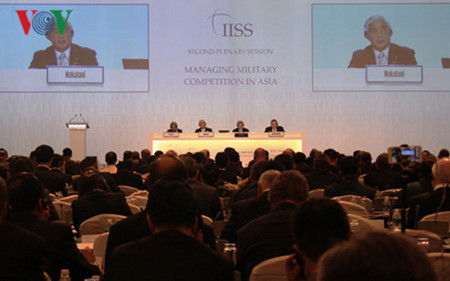Countries oppose East Sea militarization at Shangri-La Dialogue
The East Sea topped the agenda of an annual security forum of Asian and Western officials, the Shangri-La Dialogue from June 3-5 in Singapore.
The international community repeated their objections to China’s build-up and militarization of the East Sea and stressed the need to maintain freedom of sea and air navigation and to settle disputes by peaceful means that respect international law.
The 15th Shangri-La Dialogue, hosted by the London-based International Institute for Strategic Studies (IISS), was attended by hundreds of foreign ministers, defence ministers, senior security officials and security experts.
Protests against China’s groundless sovereignty claims
No other issue was debated as hotly as the current East Sea situation. Concerns have grown as China has expanded its sea patrols, and its construction of artificial islands and East Sea military bases.
Defense ministers from the US, the UK, France, Canada, and India called on Beijing to respect international law and support maritime and aviation freedom in the East Sea, one of the world’s most important sea route.
In his opening statement, Thai Prime Minister Prayuth Chan-o-cha put East Sea disputes at the 7 top security concerns in Asia-Pacific. He said the world is in a state of security imbalance and that the parties involved need to build mutual trust and respect each other.
The Thai Prime Minister called on nations to reduce the nationalism of their territorial claims and pay more attention to their common interests.
At the first plenary session on June 4 themed “Meeting Asia's Complex SecurityChallenges”, US Defense Secretary Ashton Carter expressed deep concern about the pace and scope of land reclamation in the East Sea, the prospect of further militarization, and the potential for these activities to increase the risk of miscalculation or conflict among claimant states.
He said East Sea tensions pose challenges but provide opportunities for China and other regional countries to build a mechanism to prevent conflicts.

At the second plenary session on June 4 themed “Managing military competition in Asia”, Japanese Defense Minister Gen Nakatani warned that China’s acts are challenging the regional status quo and world order. He noted that no country is an outsider of this issue because it concerns maritime safety and freedom in a region which is vital to global trade.
Minister Nakatani said no country should use force to advance its territorial claim. Indian Defense Minister Manohar Parrikar echoed the demand for maritime and aviation freedom in line with international law, including the UN Convention on the Law of the Sea.
Adherence to international law, cooperation instead of confrontation
Before hundreds of attendees from ASEAN, Europe, China, and the US, Thai Prime Minister Prayuth Chan-o-cha called on East Sea claimants to choose cooperation instead of confrontation.
He voiced Thailand’s support for peaceful measures, including the 1982 UN Convention on the Law of the Sea, saying that a full and effective implementation of the Declaration on the Conduct of Parties in the East Sea (DOC) will create momentum for adopting a Code of Conduct of Parties in the East Sea (COC).
Japanese Defense Minister urged nations to strictly implement the DOC, respect maritime freedom and settle disputes through peaceful means, including international rulings.
French Defense Minister Yves Le Drian underlined the strong effect of the UN Convention on the Law of the Sea and the need to complete the COC.
VOV5

